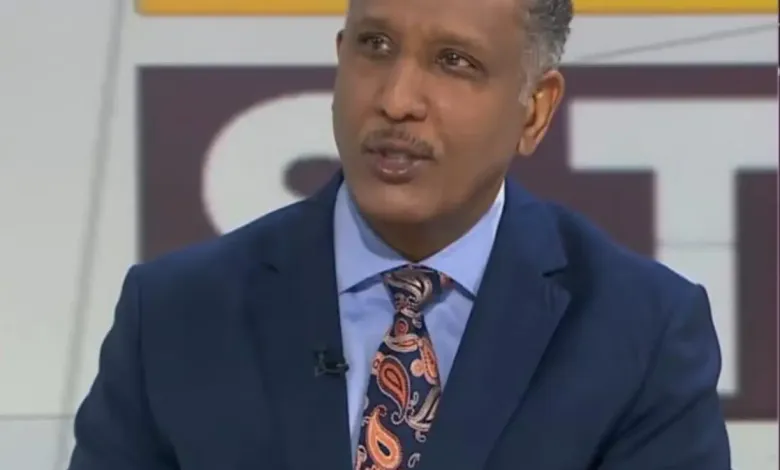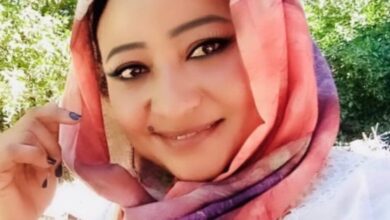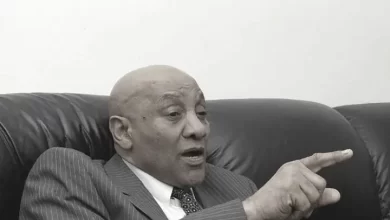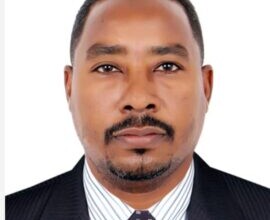Particularism: The Sudanese Politics Syndrome
Dr. Al-Waleed Adam Madibo

Over the past decades, Sudan has suffered from armed conflicts that have resulted in a profound impact on the Sudanese character, drawing it closer to particularism, eccentricity, randomness, and demagoguery than to rationality and objectivity.
These phenomena are closely linked to the Salvation (Inqaz) regime that lasted for three decades, during which it sought to create an environment of political fluidity and produced a comprehensive approach that contributed to the dismantling of social fabric and caused the erosion of moral and intellectual values.
Since the Salvation (Inqaz) elites lack moral restraint and national conscience, they exploit the intellectual vacuum resulting from years of repression to pit citizens against each other and rely on citizens’ despair of the traditional political process, especially since it has produced nothing but repeated failure, greed, and impotence, which was a clear feature of the recent transitional period.
We must acknowledge that the moral ambiguity and the miserable executive performance of the two councils (the Sovereignty Council and the Council of Ministers) directly or indirectly caused the outbreak of war. We ought to feel our way in the next stage so as not to fall victim to an overwhelming emotion or a despicable Kizani cunning scheme. This requires everyone to bear their fair share of responsibility and expect accountability in proportion to the crime they committed.
However, these elites aren’t exactly calling for the creation of new systems of thinking and consideration of how individuals interact with political and social events or exploring ways to build a more aware society that is capable of change. Rather, they promise citizens a more comprehensive system and cling to brutality and abuse as a means of taming opponents and those who disagree with their sterile visions that have brought destruction and devastation to the entire country. They are aided in this by the demagoguery that has complied with propaganda and accepted populism as a means of rallying around fictitious and vague figures.
The American philosopher Noam Chomsky points out that “Propaganda is one of the methods of controlling minds, as it is used to direct public opinion towards certain goals.”
If only the matter was limited to demagoguery, but unfortunately it included academics and intellectuals who contributed to enhancing chaos, as the scene is dominated by disparity and confusion, instead of leading the people towards positive change that requires agreement on principles, not verbal conflicts, in addition to the embellishment of banners to beautify the image of war and herald the creation of a society free from the image of the “other”.
Throughout history, there has never been an immaculate war, and all means have failed to banish the “other” from the imagination or collective memory. Therefore, a formula must be created for coexistence between the Sudanese, and for the mobilization of everyone to contribute to the advancement of the country.
According to the French philosopher Paul-Michel Foucault: “knowledge and power are intertwined.” This principle makes an appearance in some elites’ methods of utilizing knowledge to serve power without hesitation or deterrence, but sometimes boasting of scientific titles to support the flimsy argument such as “I am a professor, would I lie to you?” This inability reflects the elites’ lack of a true understanding of societal needs, which deepens the gap between the citizens and elites.
Society requires honesty and objectivity regardless of the consequences of this trend. We have an example in Sheikh Farah, who once said, “If honesty doesn’t save you, lying won’t save you either!”
If we were to understand the state of discontent experienced by the displaced and attribute it to their difficult economic and living conditions, then what about those migrants who live in civilized countries that care about democracy and human rights, such as England, who support criminal terrorist regimes in their home countries? Is this a case of mental delirium and psychological schizophrenia, or is it a case of mental retardation and cultural confusion? How do you explain the state of vulgarity that the Sudanese crowds who recently gathered to demonstrate against Hamdok have reached? How did the people comply with media directives that convinced them one day that Hamdok is the “savior,” and now the same party wants to convince them that Hamdok is a “double agent” at best and a traitor to his country at worst? When did the first magic wear off for the second magic to take effect? How can this reversal in positions happen? Is this due to a weak ability to think critically, or is it the result of a conflict between political forces seeking to benefit from the state of chaos? Is this the result of thirty years of controlling minds, or does it reflect a deep need for identity and belonging, as Sudanese researcher Najlaa Fadl believes? How can we understand the state of confusion experienced by intellectuals who are supposed to lead change? What role can civil society play in strengthening cultural-political identity? What are the possible strategies to achieve national consensus regardless of the state of chaos and illogical bias on ideological, ethnic or regional grounds?
With these questions, the door can be opened for a deeper discussion regarding the reality and future of Sudan, hopefully, the ideas presented will contribute to finding solutions to the challenges facing the country. Its not enough to criticize “Tagadom” and accuse it of operating without a popular base, as mere opportunism doesn’t constitute an objective argument for the recipient, whether Sudanese national or a foreigner. Rather, we must create channels of communication between all civil bodies seeking to end the war, as the characteristic of civil conflict is that it doesn’t rely on the zero-sum equation.
Putting forth efforts to reduce the suffering of the Sudanese people is everyone’s duty, for that suffering won’t end until the war stops, and we ought to consider how to restore stability and plan for the future of Sudan in a sound manner. Today, we are far removed from democracy, hence, we must create a ruling equation that exempts the two parties to the conflict from contributing to the complexity of the scene and provides an opportunity for their popular supporters to consider methods of civil rule that lead to democracy following the availability of moral and material infrastructure.
I would rather take this opportunity to shed light on vital issues, the most important of which is to delegitimize this accursed war, to show the fallacy of defending the Army as the Sovereign or institutional entity, and to expose the intentions of war supporters in the name of nationalism or patriotism. This war was intended to cut off the path to the peaceful and civil revolution and then monopolize wealth and power. I don’t particularly care who started the war, as both are immersed in that lust or possessed by that ecstasy. And since war supporters aim to gain and score some political points, they aren’t terrified by the scale of the tragedies that have befallen the Sudanese nation. Rather, they enjoy watching the generation that rejected them and opposed them suffer the ordeal of displacement and migration, while their leadership continue to revel in the luxury of the diaspora countries, and doesn’t stop for a moment from fanning the flames of sedition and monitoring the logs of hatred, which hones with surprising accuracy on some simpletons who respond to them.
According to American researcher Barry Glyer, “Populism grows in times of crisis, when people rally around figures who promise change.” Populism is a complex political phenomenon, and we have seen its manifestations in the United States through the election of Trump. Unfortunately, the Sudanese people rally around the “Alenserafi” while the Americans rally around the “deviant.” The first is anonymous, pretends to be a man and takes pride in insulting religion. The second is known and has been convicted in criminal cases. In other words, he failed to prove his moral soundness, but at least he succeeded in proving his human virility.
When supporters of the Sudanese Army speak about the Sovereignty of the Sudanese State, its a serious matter, especially since this Sovereignty has never been violated as it was during the era of the Salvation regime, which was marked by the presence of the largest UN Mission in the world, similar to what happened in the genocide of the Sudanese nationals in the south and west of the country. Talking about institutionalism at a time when the Salvation gang generates militias from the wombs of Sudanese tribes is a confusing matter, as it has always been keen to incite contradictions between the Arab and non-Arab tribes, among Arab tribes, as well as among non-Arab tribes, up to the latest violations that contributed to the destruction of the Sudanese conscience and helped tear apart the social fabric. As the Sudanese researcher Ali Babikir points out, “The regime put forth efforts to weaken social cohesion by politicizing religion and exploiting tribal divisions.”
A military and political institution with these most prominent features cannot be entrusted with the future of the Sudanese nation. Therefore, international pressure ought to be available, urging the deployment of international forces to separate the warring parties and impose a no-fly zone because neighboring countries and the Sudanese Army use aviation to undermine the security of Sudanese nations that reject the guardianship of the Salvation gang and demand their right to discuss the social contract, review the structure and framework of the State, and reach a comprehensive national settlement that puts an end to the fighting and establishes a sustainable economic, social and developmental system.
Given the nature of military conflicts in Sudan, a military solution is like a mirage in a desert, the thirsty believes it to be water, until he comes up to it, and finds it to be nothing, but he finds Allah (ever) with him, Who will pay him his due. And Allah is Swift in taking account.
I cannot claim to possess the knowledge about how the corrupt Kizan justify to themselves the idea of exploiting the war and jumping over the bodies of citizens to attain fleeting power and its fleeting pleasure!
Finally, I don’t understand how a group or party intends to withdraw from or resist a civil effort that aims to unify the efforts of the Sudanese people in opposing the war, unless -said group or party- is a silent ally of one of the two warring parties or an insurgent demagogue seeking fame, by issuing statements or reciting resolutions, at the expense of considering how to protect civilians from destruction and death.
It is therefore necessary to learn a lesson from previous wars in Sudan that didn’t stop except through regional and international pressures that surrounded the belligerents through the activation of collective awareness that deprived the belligerents of populism/particularism, as one of the most deadly weapons they rely on in promoting lies in the name of nationalism sometimes or in the name of patriotism at other times, and obligated them to the means of peace that must be designed and supervised by civilian authorities in cooperation with the military in order to avoid the mistakes that occurred in Naivasha and Abuja, which made peace an exclusive gain for the military.





